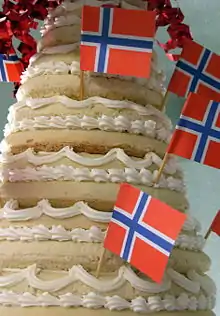Kransekake
The kransekage (literally wreath cake) is a traditional Danish (kransekage) and Norwegian (kransekake/tårnkake (tower cake)) confection, usually eaten on special occasions such as 17th of May (Norwegian national day) and New Year's Eve. In Denmark it is exclusively eaten as part of the traditional New Year celebration.
 A small kransekake, decorated with nuts and fruit as well as the traditional white glaze | |
| Alternative names | kransekage, kransekake, kransakaka |
|---|---|
| Type | Cake |
| Course | Dessert |
| Place of origin | Denmark |
| Serving temperature | Cold |
| Main ingredients | Almonds, sugar, egg whites |
| Variations | Overflødighedshorn |
The very similar cake, overflødighedshorn, is traditionally served at weddings and baptisms.
Cake

Kransekage take the form of a series of concentric rings of cake, layered on top of each other in order to form a steep-sloped cone shape—often 18 or more layers—stuck together with white icing.[1] Kransekage cake rings are made with almonds, sugar, and egg whites.[1] The ideal kransekage is hard to the touch, yet soft and chewy.
The original variant used at weddings is called overflødighedshorn (horn of plenty) and is shaped like a cornucopia and filled with chocolates, cookies, and other small treats. Sometimes a bottle of wine or akvavit is placed in the center, and the cake is decorated with ornaments such as crackers and flags.
The origin of the Kransekage can be traced to the 18th century, where it was first created by a baker in Copenhagen.
Serving
This confection is served by separating individual rings and breaking them into smaller pieces. In recent years the kransekake when mass-produced is sold year round in the shape of dessert bars. Mass-produced kransekake is available in stores around Christmas and before New Year's Eve.
Traditions
One cultural tradition is for the bride and groom to lift the top layer of the cake at their wedding. The number of cake rings that stick to the top one when they lift it is said to be the number of children the couple will have.[1]
See also
- Danish cuisine
- List of Norwegian desserts
- Norwegian cuisine – Culinary traditions of Norway
Notes
- O'Leary, Margaret Hayford (2010).
References
- O'Leary, Margaret Hayford (2010): Culture and Customs of Norway, ABC–CLIO, ISBN 9780313362484
- Denmark.dk: "KRANSEKAGE" A Danish New Year tradition, Ministry of Foreign Affairs of Denmark. An instructional video.
